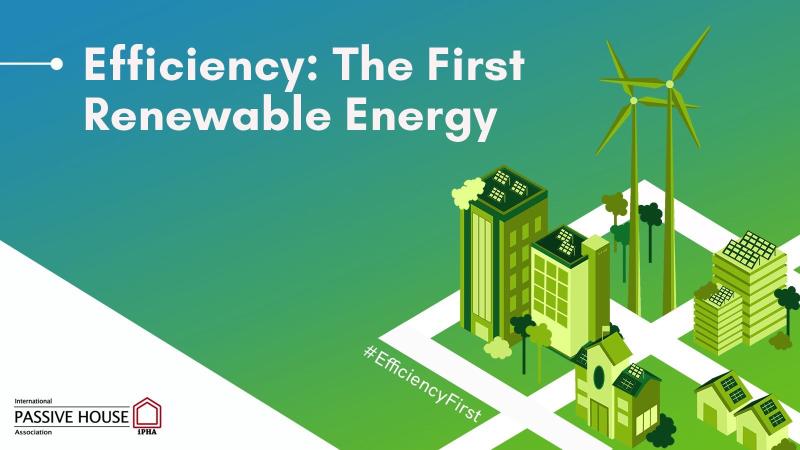Efficiency: The First Renewable Energy
By: Amory Lovins (Treehugger)


How did human civilization survive without cheap, abundant fossil fuels? Human civilization was created using renewable energy. And efficient use of energy was far more important than it is today.
The availability of cheap, abundant fossil fuels, primarily over the last 120 years, has made us all complacent about wasting energy. And now we are attempting to retain that wasteful attitude toward energy with alternatives. We want renewable energy to be as cheap and abundant as fossil fuels so we won't need to be concerned with wasted energy. We are attempting to incorporate the inefficiency of fossil fuels into a clean energy future.
While there is an obvious desire to claim efficiency is something new and modern for marketing purposes, the reality is that we are attempting to relearn what was common knowledge in ancient times. One of the first renewable technologies was window glass incorporated into architecture over 3000 years ago. Passive heating and cooling was incorporated into architecture thousands of years ago before window glass was developed.
Fossil fuels has made us lazy, wasteful, and forgetful. We model ancient climates to learn how fossil fuels are harming the climate. Perhaps we can learn something from ancient energy use, too.

The International Passive House Association (iPHA) launched a campaign—"Efficiency: The First Renewable Energy"—with the goal "to raise awareness for the vital role energy efficiency in buildings plays in meeting our climate goals." The iPHA is a global network of 22 affiliate organizations promoting the concept of Passive House; it has been promoting energy efficiency for its entire existence—it is the raison d'etre of the movement. The new campaign raised some fundamental questions, like why now? And why this particular campaign?
What is Passive House?
Passive House or Passivhaus is a building concept where heat loss or gain through the walls, roof, and windows is drastically reduced by the use of insulation, high-quality windows, and careful sealing. It's called "passive" because much of the heating required is met through "passive" sources such as solar radiation or the heat emitted by occupants and technical appliances.
According to the iPHA: "The campaign aims to raise awareness for the vital role energy efficiency in buildings plays in meeting our climate goals. The campaign also demonstrates that energy-efficient buildings provide a comfortable, healthy, and sustainable built environment."
The concept of energy efficiency as a resource is not new either. It was originally proposed over 30 years ago by Amory Lovins of the Rocky Mountain Institute, in what he called "The Negawatt Revolution," writing that "because it's now generally cheaper to save fuel than to burn it, global warming, acid rain, and urban smog can be reduced not at a cost but at a profit." He wrote of energy savings as a resource with real economic value.
We have been talking about energy efficiency since the 1970s, the RMI since the '90s, and the Passive House movement since it started 25 years ago—perhaps we take it for granted. Furthermore, since the 2015 Paris Agreement, we have generally been talking a lot more about carbon, which we have to emit less of, than we have about energy, which can be carbon-free.
For the last few years, I have actually avoided talking about Passive House in terms of energy efficiency and spent a lot more time talking about carbon emissions, both upfront emissions from the materials and construction and operating carbon emissions from fossil fuels consumed. Recently I had gone so far as to suggest that in really efficient buildings, upfront and embodied carbon emissions were the major issues of our time.
After watching Giorgia Tzar of the iPHA present the campaign (2:40 on video) on the Passive House Accelerator Happy Hour, I interviewed her to get a better understanding of why this campaign, and why now. She didn't waste much time getting straight to the point.
"There has been a tendency of late among the energy and the building community to focus on embodied energy only, and what we are aiming to do here is not lose sight of the forest for the trees," says Tzar. "Embodied carbon is very important, we can't lose sight of that, but it is a one-time carbon investment. At the end of the day, we fundamentally have to deal with both, we just want to make sure that people are prioritizing an efficiency first approach, because 1) it is scientifically proven that the Passive House standard achieves that and 2) When we are looking at it from a full lifecycle [in a conventional building] operating emissions still make up the majority."
A good reason for stressing efficiency first is that it creates the groundwork for renewable energy because so much less is needed. But the main thing, says Tzar, is they "just want to make sure that efficiency is still at the table."
Another point made by Tzar is that the campaign's point is "efficiency is the first renewable energy." Energy efficiency is intangible to some people since they think they have to forgo something, whereas renewable energy sounds positive. Tzar says: "We are trying to make the topic accessible and attractive." She noted how one speaker at a meeting pointed out that "energy efficiency isn't very sexy."
This is an issue we have discussed on Treehugger before, asking how do you sell the idea of Passive House? Everyone loves looking at solar panels and Powerwalls—so much to show your neighbors! But, as I previously pointed out: "By comparison, Passivhaus is boring. Imagine telling your neighbor, 'Let me describe my air barrier,' because you can't even show it, or the insulation. It is all passive stuff that just sits there."
It will be interesting to see if the message gets through or if it will still seem just as intangible and invisible as an air barrier. Discussing energy efficiency now is also a good pushback against the flavor of the month, net-zero, recently described by my colleague Sami Grover as "a recklessly cavalier 'burn now, pay later' approach." A form of net-zero is popular in the green building world, where people put enough solar on the roofs of their not particularly efficient houses, sell the power in summer, buy it in winter, and hope to zero out what they supply and demand.
I have tried to make the case that it is far more important to reduce demand to as close to zero as possible; then you don't need very much renewable power at all. This is is also a position made in the "Efficiency First" campaign—it is easy to go to true net-zero when it is such a small step.
Tzar notes that "people want a silver bullet," but these are complicated and difficult issues to explain. "We need to worry about operating energy, embodied energy, and renewable energy, we need to deal with all of these things," she says. "The complexity of the climate challenge, the carbon challenge, just seems insurmountable to some people, and that's why we went with Efficiency First, and efficiency is the first renewable energy, we just wanted it to be easy access, to be comprehensible."
This is a valid point: All of my talk about embodied or upfront carbon is meaningless if you don't have efficiency first, otherwise, it is overwhelmed by operating emissions. Talk about renewable energy is meaningless if you need an acre of solar panels to heat a house—it doesn't scale.








Energy without efficiency is just waste for the sake of waste. That's no different than just burning oil and coal in a bonfire for entertainment because it is cheap and abundant.